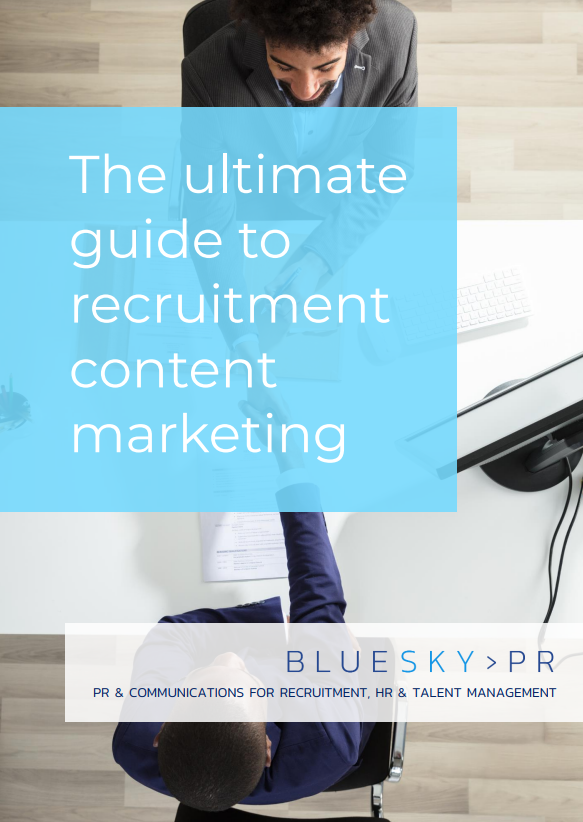The ultimate guide to recruitment content marketing

Free Guide: The ultimate guide to recruitment content marketing
What is content marketing?

Content marketing is the process of developing and distributing relevant, useful, topical content. Whether this is in the form of blogs, social media posts, newsletters, white papers or videos to current and potential customers. When content marketing is done correctly, the content produced conveys your business's expertise and makes it clear that you understand your market.
In this ever-digital age, content marketing has become more and more popular. With platforms such as TikTok having astronomical growth, companies that can produce relevant content on current and viral platforms are much more likely to succeed.
Content marketing is essential for businesses looking to generate leads and increase engagement. This guide will explain the benefits of a successful content marketing strategy, with tips on what you can do to enhance and develop your recruitment firm’s content marketing.
Important steps to build your content marketing plan

- Know your audience
- Establish your KPIs
- Set your mission and establish your goals
- Access your current position
- Create a content calendar
- Identify and allocate resources
- Figure out the best content channels for your firm
- Distribute and market
- Measure your results
Types of content to enhance your recruitment marketing activities
1. Blog posts
Blogging is one of the most popular types of content marketing for recruitment businesses as it enables you to demonstrate your knowledge of the sectors you specialise in, provide thought leadership and offer advice to candidates, clients and potential new hires.
Blog posts can be incredibly effective when authored, or ghost-written, by different employees in your recruitment agency, from the CEO to the heads of divisions or marketing managers. This enables you to present a diverse range of insights and opinions from across the business.
2. Infographics
Infographics are incredibly versatile and can be used as part of a blog post to provide additional context, or posted separately on social media as a piece of stand-alone content.
3. Podcasts
Podcast consumption witnessed a huge increase in 2020 with 9.4 million weekly listeners in the UK – an uptick of 45% over the previous 12 months. And because of this, many recruitment firms and suppliers are now producing podcasts to capitalise on this growing demand for audio content.
Podcasts help to humanise brands and give them a voice that job seekers and end-hirers can relate to. They also provide you with a unique opportunity to present your take on the latest industry trends, offer advice and share insights into your company culture – which can be extremely beneficial for employer of choice messaging when hiring internally.
4. Video
Video is another form of content marketing that has seen exponential growth in the recruitment industry over the last few years.These have more often than not take the form of talking head videos, where an individual talks directly to the camera of their smartphone or laptop. These are incredibly effective outlets for recruitment professionals to get yourselves in front of your audiences on social media. While they may lack the polish that a professionally filmed video possesses, the rawness adds to the authenticity and you can style with company branding and add captions either in app or via speech-to-text software.
5. CV and interview guidance
This can be an excellent way for recruitment firms to share some tips and tricks whilst also adding value to a candidate’s journey with your firm. Make sure you showcase you specialist knowledge, i.e. if you can create CV and interview guidance that is specific to your industry this will generate engagement from the right people - show readers what is unique to your sector, how interviews may differ and what candidates can expect.
Establishing your content marketing strategies

Whether you already have an established content strategy in place or if you're only just starting to consider making a strategy, revisiting this should always be at the forefront of your company’s mind. Things change, we've seen that only too much over the past few years, and your strategy needs to change with the times.
AND least we forget - great content isn't just something you write and forget about, it is constantly changing and evolving so that it's up-to-date, innovative, and engaging for your prospects and customers.
To decide how to establish a successful content marketing strategy, it is first important to understand what a content strategy is...
A content strategy is a calculated plan of how your recruitment consultancy intends to use content (whether it be audio, visual or written) to achieve your business' goals.
Before you can bring your strategy ‘to market’ as it were, you must know exactly what your business goals are. THEN you need to establish your marketing goals. And AFTER THAT you set a goal for each piece of content.
- Do you want to increase engagement from prospects?
- Take your target audience through each stage of the marketing funnel?
- Keep customers engaged? Or perhaps re-engage past customers?
Say your goal is to increase brand awareness - you could implement a strategy that focuses on SEO, whether this is SEO centred blog content or pillar content pages such as this one. Content that has a clear goal in mind can increase your website’s visibility on search engine results pages (SERPs) and drive leads to your business.
According to the latest research from the Content Marketing Institute (CMI), 63% of businesses do not have a content marketing strategy, and 64% say that learning how to build a content marketing strategy is one of their greatest educational needs. Those firms that do have a plan for their content marketing find that their marketing efforts are far more successful.
When developing a content marketing strategy, it is important to answer these questions:
1. Who is your target audience?
Who do you want to read your content?
- What publications do they read?
- What social media sites are they on?
- What associations or professional bodies are they members of?
- What is their current job role and how senior are they?
- What are their goals?
- What are their biggest challenges?
- How do they spend their free time?
(useful resources on this over on our blog)
.png)
Just as your business might have more than one type of customer or consumer, your content strategy can cater to more than one type of user. This can be achieved by using a variety of content types, e.g., videos, blogs, infographics, social posts, and white papers, via different channels. This will help you to deliver content tailored to each audience strand you are trying to attract.
Just remember the age old adage:
"You can't be all things to all people"
2. What makes you stand out and why should your content be consumed?
It is important to understand that your competitors in the recruitment industry will likely be producing the same sort of content and have a similar service offering to you, so your audience or potential customers need to know what makes you different.
What is your company's main asset? Maybe you’re an extremely established recruitment agency with high profile directors who are frequently quoted in the press. Or perhaps you specialise in a niche sector and have collected insights from discussions with your clients and candidates? It could be that you carry out an annual survey full of data and statistics you can share?
Once you nail down what it is that makes you worth listening to / reading, you can use this in your content.
3. What problem will you be solving for your audience?
Consumers and customers only want content that is specifically targeted to them. Which is why the best way to get your audience to engage with your content is to solve a problem for them. Educating your readers and helping them address their problems builds trust and demonstrates your expertise.
4. What forms of content will you focus on?
In short, you need to put your content where your audience is. Whilst it is tempting to launch a TikTok page due to the massive growth its had in the last few years, you need to find out whether your audience are on there first. You don't want to waste your time creating content marketing ideas that won’t reach your target audience.
When you know what platforms to use, then you can hone in on producing content forms that are suitable for these. If your audience is predominantly active on Instagram and TikTok you know to focus on shorter form content and quick burst videos that capture attention quickly. If your audience spends more time on YouTube consuming long-form video content, then that's what you need to be producing.

5. How are you going to manage your content creation and publication?
You've done your research, you know which forms of content you need to be using and where to post them - now you need a content creation and delivery plan.
In a small team, this may be easier as you are likely one of, if not the sole decision-maker when it comes to content. On the other hand, if your recruitment agency is on a larger scale, you may need to collaborate with several content teams to configure an effective process of publication.
This is where the right tools come into play - from visual collaboration tools you can use to build out your content calendar such as Asana, Trello, Google Sheets etc. to content scheduling tools like Hootsuite, Later and Sprout Social.
The importance of content marketing for recruitment

In our ever-digital world, content needs to be at the heart of every firm’s recruitment marketing strategy. When utilised correctly it enables your business to generate brand awareness, build relationships with candidates and clients, and bring your overall marketing costs down.
A vital part of a recruiter’s marketing strategy is to make sure your talent pool is stocked with the best quality candidates and that your company is an attractive place to work. Therefore, your recruitment and marketing need to work together.
Using content marketing to boost recruitment efforts
Recruiters want to attract the best and the brightest candidates and content marketing is the way to achieve this. Data from Small Business trends states that over 91% of businesses use content marketing for both lead-generating and recruitment efforts. By using content correctly and sharing it correctly you can pull in the right people to take your recruitment business to the next level.

A guide to building a content marketing strategy for recruiters
1. Describe your ideal candidate
You can’t expect to attract the best candidate if you don’t know who that is. You need to know important details about your target audience.
Ask yourself and your fellow recruitment consultants what kind of candidates do you want to attract?
How would you professionally describe them?
Make a checklist that includes demographic information, background, personality attributes, qualifications, career goals and objections. By doing this you’ve collected vital information about your candidates that can help identify your candidate persona.
2. Create a candidate journey map
A candidate journey map is a visual representation of a candidate’s journey when applying for a position with you. It needs to include all the touchpoints candidates will have with your recruitment consultancy from first becoming aware of your brand, to applying, right through to being placed as a candidate and eventually working with you as a hiring manager on the client side.
By creating a candidate journey map you can identify the best type of content that works at every stage of your candidate journey and how to showcase your employer's brand across different channels.
3. Build your content calendar
Creating a content calendar is essential when it comes to having a successful content marketing strategy. This can be a digital or written plan of the exact dates you intend to publish your content and share it with your audience. Consistently sharing content will improve the relationship your audience has with you and increase your credibility.
How to use content in your recruitment strategy

At its core, content is created to educate and spread information. Whether your content is in the form of blogs, whitepapers or website content etc., the content you create should always offer information that helps your desired audience or informs their decision.
Recruitment content marketing can be used to help manage expectations around job openings and to get a candidate up to speed quickly. When used correctly, it is one of the most beneficial tools for recruiting new hires and getting your business’s name out there.
1. Incorporating the correct content into your strategy
Whilst jumping on the bandwagon and creating content on trending topics may work to get engagement, it will only work towards your companies goals if it is relevant to your audience. So, step one should always be to start thinking about content that demonstrates your recruitment expertise or and content that will increase brand awareness. Creating planned and strategic content is almost always better than spontaneous content - this is where your content marketing strategy will come into play.
If you’re unsure of where to start with content creation, blog content is nearly always the best option. Create content that demonstrates and promotes your company's mission statement, culture, product or basic values and practices. This sort of content not only creates engagement from your team but also shows potential candidates and prospects what it’s actually like within the office walls, the people behind the business and what your company is all about.
This is where recruiters and marketing can really work together to come up with topics and areas within your industry that potential candidate are confused about or that clients have the most questions about.
2. Social media
Social media is not only an excellent platform for recruiting and searching for new talent, it can also be used for brand building, talent attraction and lead generation. When the whole team are utilising social media correctly, taking a combined approach to sharing different forms of content (videos, infographics, carousels, polls, etc) and engaging with others, not only will this create engagement but it will increase the credibility of your brand and consultants.
Social media is also the platform where arguably you can take the most ‘risks’ with the content you are creating. It’s a great way to let your recruitment agency’s personality shine.
3. Create recruitment collateral
Whether it be be physical collateral you take to events or PDF collateral available to download via your website, give your audience something they can takeaway. Reports, eBooks and whitepapers are fantastic longer form content types to show potential clients your expertise.
Better yet, you can track downloads via your website and create a follow up strategy.
.png)
4. Measuring the success of your recruiting content
Tracking in recruitment is always tricky. You have to ask the right questions to see the full picture and understand your true ROI. A candidate could be following you on Twitter, which could be their first point of contact, then read an article on your blog, then see your comment in Global Recruiter, before applying to an ad on a job board, but the source for the fee is only tracked as the job board. Content marketing strategies are designed to demonstrate your standing as an expert within the market and to encourage your targets to engage with your company – but it may take seeing your brand on multiple occasions, on multiple platforms, to achieve a conversion. Tracking only the last point before contact doesn’t give you the full story and provides an inaccurate representation of the performance of your engagement channels. This can be rectified by asking more questions of placed candidates – and new clients - (as well as monitoring followers and click throughs where possible) did they follow you on Twitter? Did they like your Facebook page?
Recruitment marketers rarely jump to take the credit for sales that they deserve – if in fact they have been able to track and prove their success. They are often too busy supporting people within the business that they forget their own goals such as demonstrating the value they add to the business by highlighting (on the CRM) the number of candidates they have delivered into the talent pool. Pinpointing where someone first encountered your recruitment brand will allow you to collect more meaningful data on engagement strategies.
And don’t forget to count the engagement that lead to a warm lead, which was nurtured over time to finally result in a sale. Or the collateral that was used for business development. These also count towards your content marketing successes.
Whatever content strategy you employ, you need to understand that it will take a real investment of time before you begin to see any measurable return. You need to build a following, by creating content and testing it before you know what does and doesn’t work for your market. Aiming your messages at the right audience is important, as is setting objectives and goals – ask yourself what are you looking to achieve? Candidate attraction? Client acquisition? Increased brand awareness? The key to success is to look at each of your distribution channels and strategically segment your audiences. That way your content will be hitting the correct targets and you will be measuring your success in regards to specific engagement goal.
In summary, when it comes to measuring the success of your content marketing: set objectives. have a plan, include consultants, use your content, and track everything.

